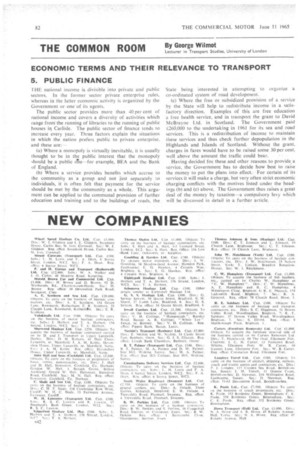THE COMMON ROOM By George Wilmot
Page 84

If you've noticed an error in this article please click here to report it so we can fix it.
Lecturer in Transport Studies, University of London
ECONOMIC TERMS AND THEIR RELEVANCE TO TRANSPORT 5. PUBLIC FINANCE
THE national income is divisible into private and public sectors. In the former sector private enterprise rules, whereas in the latter economic activity is organized by the Government or one of its agents.
The public sector provides more than 40 per cent of national income and covers a diversity of activities which range from the running of libraries to the running of public houses in Carlisle. The public sector of finance tends to increase every year. Three factors explain the situations in which the nation prefers public to private enterprise, and these are: (a) Where a monopoly is virtually inevitable, it is usually thought to. be in the public interest that the monopoly should be a public ourie-for example, 13EA and the Bank of England.
(b.) Where a service provides benefits which accrue to the community as a group •and not just separately to
• individuals, it is often felt that payment for the service should be met by the community as a whole. This argument can be applied to the communal provision of further education and training and to the buildings of roads, the State being interested in attempting to organize a co-ordinated system of road development.
(c) Where the free or subsidized provision of a service by the State will help to redistribute income in a satisfactbry direction. Examples of this are free education a free health service, and in transport the grant to David McBray-ne Ltd. in Scotland. The Government paid 260.,000 to the undertaking in 1961 for its sea and road services. This is a redistribution of income to maintain these services and thus check further depopulation in the Highlands and Islands 6f Scotland. Without the grant, charges in fares would have to he raised some 30 per cent, well above the amount the traffic could bear.
Having decided for these and other reasons to provide, a service, the Government has to decide how best to raise the money to put the plans into .effect.. For certain of its services it Will make a charge, but very often strict economic charging conflicts with the motives fisted .under the headings (b) and (c). above. The GovernMent thus raises a:great deal of the money by taxation-a compulsory levy which will be discussed in detail in a further article.




























































































































